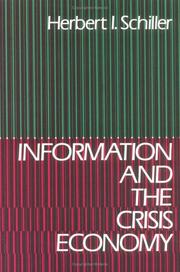| Listing 1 - 5 of 5 |
Sort by
|
Book
ISBN: 2020093227 9782020093224 Year: 1986 Publisher: Paris : Seuil,
Abstract | Keywords | Export | Availability | Bookmark
 Loading...
Loading...Choose an application
- Reference Manager
- EndNote
- RefWorks (Direct export to RefWorks)
Computers and civilization --- Ordinateurs et civilisation --- 681.3 --- informatique --- fraude --- Civilization and computers --- Civilization --- Computerwetenschap --- informatica --- 681.3* / / / / / / / / / / / / / / / / / / / / / / / / / / / /
Book
ISBN: 0394546229 0394751752 9780394546223 Year: 1986 Publisher: New York Pantheon books
Abstract | Keywords | Export | Availability | Bookmark
 Loading...
Loading...Choose an application
- Reference Manager
- EndNote
- RefWorks (Direct export to RefWorks)
Computers and civilization --- Ordinateurs et civilisation --- Civilization and computers --- Civilization --- Computers and civilization. --- Lerarenopleiding --- Pedagogiek en onderwijskunde --- algemeen --- onderwijstechnologie --- algemeen. --- onderwijstechnologie.
Book
ISBN: 222104424X 9782221044247 Year: 1986 Publisher: Paris : Editions R. Laffont,
Abstract | Keywords | Export | Availability | Bookmark
 Loading...
Loading...Choose an application
- Reference Manager
- EndNote
- RefWorks (Direct export to RefWorks)
Culture. --- Diffusion culturelle. --- Médias --- Influence. --- France --- Civilisation --- Computers and civilization --- Computers and civilization. --- culture --- cultuur --- Médias --- Civilization and computers --- Civilization

ISBN: 9780674169869 0674169867 0674169859 9780674169852 Year: 1986 Publisher: Cambridge : Harvard University Press,
Abstract | Keywords | Export | Availability | Bookmark
 Loading...
Loading...Choose an application
- Reference Manager
- EndNote
- RefWorks (Direct export to RefWorks)
Why do we find ourselves living in an Information Society? How did the collection, processing, and communication of information come to play an increasingly important role in advanced industrial countries relative to the roles of matter and energy? And why is this change recent-or is it? James Beniger traces the origin of the Information Society to major economic and business crises of the past century. In the United States, applications of steam power in the early 1800s brought a dramatic rise in the speed, volume, and complexity of industrial processes, making them difficult to control. Scores of problems arose: fatal train wrecks, misplacement of freight cars for months at a time, loss of shipments, inability to maintain high rates of inventory turnover. Inevitably the Industrial Revolution, with its ballooning use of energy to drive material processes, required a corresponding growth in the exploitation of information: the Control Revolution. Between the 1840s and the 1920s came most of the important information-processing and communication technologies still in use today: telegraphy, modern bureaucracy, rotary power printing, the postage stamp, paper money, typewriter, telephone, punch-card processing, motion pictures, radio, and television. Beniger shows that more recent developments in microprocessors, computers, and telecommunications are only a smooth continuation of this Control Revolution. Along the way he touches on many fascinating topics: why breakfast was invented, how trademarks came to be worth more than the companies that own them, why some employees wear uniforms, and whether time zones will always be necessary. The book is impressive not only for the breadth of its scholarship but also for the subtlety and force of its argument. It will be welcomed by sociologists, economists, historians of science and technology, and all curious in general.
Communication --- Information technology --- Information society. --- Computers and civilization. --- Technologie de l'information --- Société informatisée --- Ordinateurs et civilisation --- Social aspects --- Aspect social --- Information society --- Computers and civilization --- 007.5 --- 34:681.3 --- -Computers and civilization --- -#SBIB:IO --- #SBIB:316.334.2A24 --- IT (Information technology) --- Technology --- Telematics --- Information superhighway --- Knowledge management --- Sociology --- Civilization and computers --- Civilization --- Communication, Primitive --- Mass communication --- Zelfwerkende systemen --- Informaticarecht --- -Social aspects --- -Technologische verandering: algemene ontwikkelingen (mechanisering, automatisering) --- 34:681.3 Informaticarecht --- 007.5 Zelfwerkende systemen --- Société informatisée --- #SBIB:IO --- Technologische verandering: algemene ontwikkelingen (mechanisering, automatisering) --- Social change --- Computer. Automation --- United States --- Communication - Social aspects - United States --- Information technology - Social aspects - United States --- United States of America

ISBN: 0195205146 9780195205145 Year: 1986 Publisher: Oxford : Oxford University Press,
Abstract | Keywords | Export | Availability | Bookmark
 Loading...
Loading...Choose an application
- Reference Manager
- EndNote
- RefWorks (Direct export to RefWorks)
Social change --- Mass communications --- Economic production --- 316.771 --- Computers and civilization --- Economic history --- -Mass media --- -Political participation --- Telecommunication --- -#SBIB:309H1012 --- #SBIB:309H1720 --- Electric communication --- Mass communication --- Telecom --- Telecommunication industry --- Telecommunications --- Communication --- Information theory --- Telecommuting --- Citizen participation --- Community action --- Community involvement --- Community participation --- Involvement, Community --- Mass political behavior --- Participation, Citizen --- Participation, Community --- Participation, Political --- Political activity --- Political behavior --- Political rights --- Social participation --- Political activists --- Politics, Practical --- Media, Mass --- Media, The --- Economic conditions --- History, Economic --- Economics --- Civilization and computers --- Civilization --- Informatiekunde --- Social aspects --- Media: communicatiepolitieke aspecten / mediabeleid (nationaal en internationaal) --- Informatiekunde, informatie management --- 316.771 Informatiekunde --- Mass media --- Political participation --- #SBIB:309H1012 --- Society and telecommunication --- Histoire économique --- Participation politique --- Ordinateurs et civilisation --- Médias --- Télécommunications --- Information --- Informatique --- 1971-1990 --- Aspect social
| Listing 1 - 5 of 5 |
Sort by
|

 Search
Search Feedback
Feedback About
About Help
Help News
News